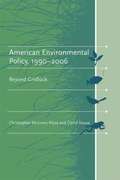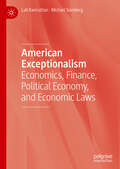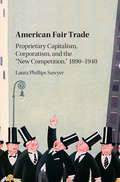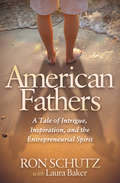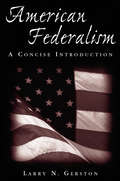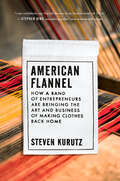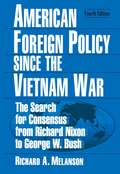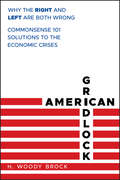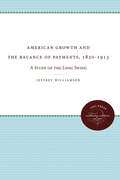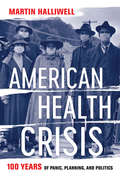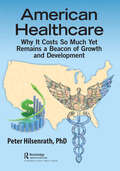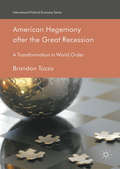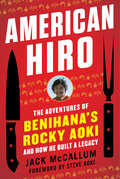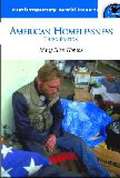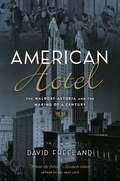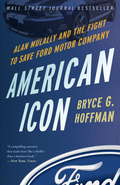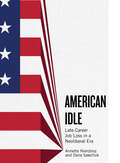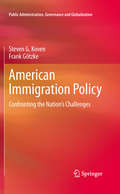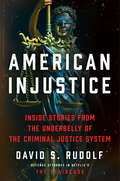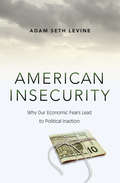- Table View
- List View
American Environmental Policy, 1990-2006: Beyond Gridlock
by Christopher Mcgrory Klyza David J. SousaThe "golden era" of American environmental law making, between 1964 and 1980, saw twenty-two pieces of major environmental legislation passed by bipartisan majorities in Congress and signed into law by presidents of both parties.
American Exceptionalism: Economics, Finance, Political Economy, and Economic Laws
by Michael Szenberg Lall RamrattanThe publication of Alexis de Tocqueville’s Democracy in America has kindled interest across disciplines to appraise the exceptional nature of U.S. activities. In general, however, all the published works have not focused their analyses from an economic point of view. While economics was for some a “dismal science” following Thomas Carlyle’s characterization of Malthus’ demographic model, it has increasingly become the “queen of the social sciences” for more practitioners. The book fills a gap in the literature by describing the American contributors as precursors and genuinely exceptional economists. We present their works within the state of the nation in which they advance their discipline.One is treated to both qualitative and quantitative theories in the opening chapter. Budding theories that became established theories of Economics and Finance are investigated in Chapters II and III. When President John Adams was confronted with M. Turgot’s criticisms of the American government, he resorted to a historic survey of types of government from ancient Greece to the Middle Ages. Similarly, we have included a final chapter, Chapter IV, to present the argument for American Exceptionalism in the domain of Political Economy and Economic Law over the ages.
American Express TRS Charge-Card Receivables
by Andre F. Perold Kuljot SinghAmerican Express (TRS) Co. is considering a proposal to securitize a portion of their consumer charge-card receivables portfolio. In the past, they have relied exclusively on a captive finance subsidiary, Credco, to perform this function. The proposed securitization structure has been put forth by Lehman Brothers and relies heavily on the existing structure of credit-card receivables' securitizations. The growing asset-backed securities market presents TRS an opportunity to diversify its sources of funds--however, there are reasons to be cautious. Due to recent downgrades of American Express and Credco debt, the perceived financial weakness of credit-card receivable backed securities issuers, and the proposal's sophisticated securitization structure, TRS is concerned that 1) The market may perceive securitization as a sign of weakness; 2) The securitization may not be cost effective. Therefore, TRS has to decide whether or not to proceed with securitization at this time.
American Fair Trade: Proprietary Capitalism, Corporatism, and the 'New Competition,' 1890–1940
by Laura Phillips SawyerRather than viewing the history of American capitalism as the unassailable ascent of large-scale corporations and free competition, American Fair Trade argues that trade associations of independent proprietors lobbied and litigated to reshape competition policy to their benefit. At the turn of the twentieth century, this widespread fair trade movement borrowed from progressive law and economics, demonstrating a persistent concern with market fairness - not only fair prices for consumers but also fair competition among businesses. Proponents of fair trade collaborated with regulators to create codes of fair competition and influenced the administrative state's public-private approach to market regulation. New Deal partnerships in planning borrowed from those efforts to manage competitive markets, yet ultimately discredited the fair trade model by mandating economy-wide trade rules that sharply reduced competition. Laura Phillips Sawyer analyzes how these efforts to reconcile the American tradition of a well-regulated society with the legacy of Gilded Age of laissez-faire capitalism produced the modern American regulatory state.
American Fathers: A Tale of Intrigue, Inspiration, and the Entrepreneurial Spirit
by Ron Schutz Laura BakerAn inspirational modern-day fable about finding success, happiness and the American dream both in business and in life. A smart and level-headed recent college graduate, Sasha thinks he has a good grip on life—until everything goes haywire. His ideal family is shattered when his mom leaves and his dad re-marries. Even more unsettling, Sasha is forced to question his own identity when he starts receiving mysterious messages from a Russian agent claiming to be his biological father. Determined to make his own way, Sasha boldly starts his own business as his enigmatic new father-figure mentors him in the ways of capitalism, personal finance, and starting a new business based on an innovative idea. Follow Sasha on his spiritual journey to his own path among friends who are from different faiths. This fast-moving tale spins an unfolding mystery while offering practical tools for life and businesses.
American Federalism: A Concise Introduction
by Larry N. GerstonUnderstanding federalism - the form of political organization that unites separate polities within an overarching political system so that all maintain their political integrity - is central to the study of democratic government in the United States. Yet, many political scientists treat federalism as a set of abstract principles or a maze of budgetary transfers with little connection to real political life. This concise and engaging book boils the discussion down to its essence: federalism is about power, specifically the tug for power among and within the various levels of government. Author Larry N. Gerston examines the historical and philosophical underpinnings of federalism; the various "change events" that have been involved in defining America's unique set of federal principles over time; and the vertical, horizontal, and international dimensions of federalism in the United States today. The result is a book examining the ways in which institutional political power is both diffused and concentrated in the United States.
American Flannel: How a Band of Entrepreneurs Are Bringing the Art and Business of Making Clothes Back Home
by Steven Kurutz&“I can confidently say this will be one of my favorite books of 2024.&” —Stephen King, bestselling author (and onetime millworker)&“American Flannel is a wonderful book--surprising, entertaining, vivid and personal, but also enlightening on the largest questions of America's economic and social future.&” —James Fallows, co-author of Our Towns The little-engine-that-could story of how a band of scrappy entrepreneurs are reviving the enterprise of manufacturing clothing in the United States. For decades, clothing manufacture was a pillar of U.S. industry. But beginning in the 1980s, Americans went from wearing 70 percent domestic-made apparel to almost none. Even the very symbol of American freedom and style—blue jeans—got outsourced. With offshoring, the nation lost not only millions of jobs but also crucial expertise and artistry. Dismayed by shoddy imported &“fast fashion&”—and unable to stop dreaming of re-creating a favorite shirt from his youth—Bayard Winthrop set out to build a new company, American Giant, that would swim against this trend. New York Times reporter Steven Kurutz, in turn, began to follow Winthrop&’s journey. He discovered other trailblazers as well, from the &“Sock Queen of Alabama&” to a pair of father-son shoemakers and a men&’s style blogger who almost single-handedly drove a campaign to make &“Made in the USA&” cool. Eye-opening and inspiring, American Flannel is the story of how a band of visionaries and makers are building a new supply chain on the skeleton of the old and wedding old-fashioned craftsmanship to cutting-edge technology and design to revive an essential American dream.
American Foreign Policy Since the Vietnam War: The Search for Consensus from Nixon to Clinton
by Richard A MelansonThis book integrates the study of presidential politics and foreign policy-making from the Vietnam aftermath to the events following September 11 and the Iraqi War. Focusing on the relationship between presidents' foreign policy agendas and domestic politics, it offers compelling portraits of presidents Nixon, Carter, Reagan, Bush I, Clinton, and Bush II. In the course of comparing the efforts of these presidents to articulate a clear conception of the national interest and to forge a foreign policy consensus, the author shows the key role of public opinion in constraining presidential initiatives, in particular the decision to use military force overseas. Never more timely, this popular text is appropriate for courses in U.S. foreign policy, the presidency, or contemporary U.S. politics.
American Generalship: Character Is Everything: The Art of Command
by Edgar PuryearAmerica's top military leaders are scrutinized as Puryear ponders what prepared our generals for the terrible responsibilities they bore during World War II, Korea, Vietnam, the Gulf War and on to today.
American Gridlock
by BrockA sensible solution to getting our economy back on track Pessimism is ubiquitous throughout the Western World as the pressing issues of massive debt, high unemployment, and anemic economic growth divide the populace into warring political camps. Right-and Left-wing ideologues talk past each other, with neither side admitting the other has any good ideas. In American Gridlock, leading economist and political theorist H. Woody Brock bridges the Left/Right divide, illuminating a clear path out of our economic quagmire. Arguing from first principles and with rigorous logic, Brock demonstrates that the choice before us is not between free market capitalism and a government-driven economy. Rather, the solution to our problems will require enactment of constructive policies that allow "true" capitalism to flourish even as they incorporate social policies that help those who truly need it. Brock demonstrates how deductive logic (as opposed to ideologically driven data analysis) can transform the way we think about these problems and lead us to new and different solutions that cross the ideological divide. Drawing on new theories such as game theory and the economics of uncertainty that are based upon deductive logic, Brock reveals fresh ideas for tackling issues central to the 2012 U. S, Presidential election and to the nation's long-run future: Demonstrating that the concept of a government "deficit" is highly problematic since it blinds us to the distinction between a good deficit and a bad deficit - where a deficit is good if it results from borrowing dedicated to productive investment rather than to unproductive spending. Deriving the need for a U. S. Marshall Plan dedicated to very high levels of profitable infrastructure spending as the solution to today's Lost Decade of high unemployment Drawing upon a logical extension of the Law of Supply and Demand to demonstrate how the health-care spending crisis can be completely resolved by letting supply increase at a faster rate than demand Utilizing the theory of bargaining inaugurated by the "Beautiful Mind" mathematician John F. Nash, Jr. , to help us avoid being repeatedly duped in our negotiations with China Making use of a completely new theory of market risk recently developed at Stanford University to demonstrate why dramatically limiting leverage is the key reform to preventing future Perfect Storms, whereas hoping to banish "greed" amounts to whistling Dixie Deducting from first principles a solution to the contentious issue of fair shares of the economic pie, a solution that integrates the two fundamental norms of "to each according to his contribution" and "to each according to his need. " Profound, timely and important, American Gridlock cuts through the stale biases of the Right and Left, advances new ways of thinking, and provides creative solutions to the problems that threaten American society.
American Growth and the Balance of Payments, 1820-1913: A Study of the Long Swing
by Jeffrey WilliamsonThe basic purpose of Williamson's study is to determine whether the Kuznets cycles, or long swings in the domestic economy, have had any consistent effect on U. S. foreign trade and, as a result, on the nation's balance-of-payments position. The author has chosen the period from 1820 to 1913 and has studied it in detail.Originally published in 1964.A UNC Press Enduring Edition -- UNC Press Enduring Editions use the latest in digital technology to make available again books from our distinguished backlist that were previously out of print. These editions are published unaltered from the original, and are presented in affordable paperback formats, bringing readers both historical and cultural value.
American Health Crisis: One Hundred Years of Panic, Planning, and Politics
by Martin HalliwellA history of U.S. public health emergencies and how we can turn the tide. Despite enormous advances in medical science and public health education over the last century, access to health care remains a dominant issue in American life. U.S. health care is often hailed as the best in the world, yet the public health emergencies of today often echo the public health emergencies of yesterday: consider the Great Influenza Pandemic of 1918–19 and COVID-19, the displacement of the Dust Bowl and the havoc of Hurricane Maria, the Reagan administration’s antipathy toward the AIDS epidemic and the lack of accountability during the water crisis in Flint, Michigan. Spanning the period from the presidency of Woodrow Wilson to that of Donald Trump, American Health Crisis illuminates how—despite the elevation of health care as a human right throughout the world—vulnerable communities in the United States continue to be victimized by structural inequalities across disparate geographies, income levels, and ethnic groups. Martin Halliwell views contemporary public health crises through the lens of historical and cultural revisionings, suturing individual events together into a narrative of calamity that has brought us to our current crisis in health politics. American Health Crisis considers the future of public health in the United States and, presenting a reinvigorated concept of health citizenship, argues that now is the moment to act for lasting change.
American Healthcare: Why It Costs So Much Yet Remains a Beacon of Growth and Development
by Peter Hilsenrath, PhDAmerican Healthcare: Why It Costs So Much Yet Remains a Beacon of Development explores economic growth and the health sector. Is the health sector a curse or a blessing? The American health sector now accounts for at least 18 percent of the economy and will likely increase in coming years. American healthcare spending per capita far exceeds that of other developed countries. Yet our health, as measured by life expectancy and infant mortality, is relatively poor by comparison with the developed world. Other measures of quality including hospital acquired infection are too common. Healthcare costs financially cripple households despite advances associated with the Affordable Care Act. There is widespread dissatisfaction with the American healthcare system and support for more change. It is also the case that the health sector has been a leader in the evolution of the American economy. The history of economic development is largely attributable to integration of new technology. We tend to applaud new technology and the improvement it brings to our lives. Important new technologies often grow rapidly and faster than the economy as a whole. This leads to larger shares of the economy. There have clearly been enormous advances in pharmaceuticals, medical devices, genomics and molecular biology as well as other subsectors. Yet there is considerable apprehension about costs and economic impact. This book details important health sector institutions and perhaps uniquely, explores linkages between healthcare and broader economic growth. The book addresses asymmetric information between providers and consumers as well as between insurers and beneficiaries. There is a focus on monopoly power in labor markets which contributes to inefficiencies in the system. The author also discusses cost-effectiveness and allocative efficiency as well as emphasizing productivity and its relationship to the wider economy. Policy directions for improved long run efficiency are provided.
American Hegemony after the Great Recession: A Transformation in World Order (International Political Economy Series)
by Brandon TozzoThis book traces America's rise as a hegemon of the capitalist system, arguing that the greatest threat to global economic stability is America's polarized and ineffectual political system rather than foreign competition from China and the European Union. The author points to China's considerable demographic problem, which will likely undermine its economic potential. Furthermore, the sovereign debt crisis in Europe - which has left the continent politically fragmented by an institutional malaise - is evidence of the United States' continued status as the world's most successful nation. Tozzo posits that, due to factors such as its initial response to the financial crisis, the near failure of its banking system, the catastrophe of the debt ceiling crisis, and the election of Donald Trump as president, the greatest threat to American hegemony is America itself.
American Hiro: The Adventures of Benihana's Rocky Aoki and How He Built a Legacy
by Jack McCallumAn in-depth biography of the famed Japanese American restaurateur, his rags to riches story, his determination in business, and his zest for life.“Traveling the world with my father, watching him interact with people, famous and ordinary, observing up close his balls-out sense of adventure, and having a larger-than-life personality to live up to had a profound effect on me and the formation of my character.” —From the foreword by Steve Aoki, Grammy–nominated producer and Billboard Award–winning DJHiroaki “Rocky” Aoki was a man who succeeded in everything he pursued—from world-class wrestling, ballooning, underwater exploration, and car and boat racing to founding Benihana. Rocky’s passion for life infected all around him and accelerated the exchange of Japanese culture and cuisine with America. His rags to riches story, from dishwasher and busboy to owner of a multi-million-dollar restaurant empire, is a wild American dream realized unlike any other. Running and expanding the business would be all-consuming for most people—not to mention battling the perception of otherness—but Rocky would not be deterred. His determination for the business rivaled the drive he demonstrated in his other interests, some of which almost killed him. American Hiro by Jack McCallum, who had full access to Rocky Aoki and those in his enterprises, provides the only full inside account of one of the most famous symbols of cultural assimilation and capitalistic zeal in modern US history—a champion in business, sports, and life.
American Home Products Corp.
by David W. Mullins Jr.American Home Products is a company with virtually no debt. Students are asked to analyze the company's debt policy and make a recommendation to the CEO. It is likely that adding debt to the capital structure would create some value for shareholders; the CEO is firmly against borrowing.
American Homelessness: A Reference Handbook (3rd edition)
by Mary Ellen HombsHombs (of the Massachusetts Housing and Shelter Alliance) offers a collection of reference materials that provide information on the pervasive problem of homelessness in the United States. Nine chapters offer a chronology of the homeless problem, brief biographical sketches of 20 people who have had an effect on homeless policy and research, statistical information, documents and government reports, legislation from the U.S. and Europe written to address the problem, a list of print and nonprint resources, and a directory of organizations and government agencies. Also included is a brief analysis and discussion of the problem, comparing Europe and the United States.
American Hotel: The Waldorf-Astoria and the Making of a Century
by David FreelandCompleted in 1931, New York’s Waldorf-Astoria towers over Park Avenue as an international landmark and a masterpiece of Art Deco architecture. A symbol of elegance and luxury, the hotel has hosted countless movie stars, business tycoons, and world leaders over the past ninety years. American Hotel takes us behind the glittering image to reveal the full extent of the Waldorf’s contribution toward shaping twentieth-century life and culture. Historian David Freeland examines the Waldorf from the opening of its first location in 1893 through its rise to a place of influence on the local, national, and international stage. Along the way, he explores how the hotel’s mission to provide hospitality to a diverse range of guests was put to the test by events such as Prohibition, the anticommunist Red Scare, and civil rights struggles. Alongside famous guests like Frank Sinatra, Martin Luther King, Richard Nixon, and Eleanor Roosevelt, readers will meet the lesser-known men and women who made the Waldorf a leader in the hotel industry and a key setting for international events. American Hotel chronicles how institutions such as the Waldorf-Astoria played an essential role in New York’s growth as a world capital.
American Icon: Alan Mulally and the Fight to Save Ford Motor Company
by Bryce G. HoffmanTHE INSIDE STORY OF THE EPIC TURNAROUND OF FORD MOTOR COMPANY UNDER THE LEADERSHIP OF CEO ALAN MULALLY. At the end of 2008, Ford Motor Company was just months away from running out of cash. With the auto industry careening toward ruin, Congress offered all three Detroit automakers a bailout. General Motors and Chrysler grabbed the taxpayer lifeline, but Ford decided to save itself. Under the leadership of charismatic CEO Alan Mulally, Ford had already put together a bold plan to unify its divided global operations, transform its lackluster product lineup, and overcome a dysfunctional culture of infighting, backstabbing, and excuses. It was an extraordinary risk, but it was the only way the Ford family--America's last great industrial dynasty--could hold on to their company. Mulally and his team pulled off one of the greatest comebacks in business history. As the rest of Detroit collapsed, Ford went from the brink of bankruptcy to being the most profitable automaker in the world. American Icon is the compelling, behind-the-scenes account of that epic turnaround. On the verge of collapse, Ford went outside the auto industry and recruited Mulally--the man who had already saved Boeing from the deathblow of 9/11--to lead a sweeping restructuring of a company that had been unable to overcome decades of mismanagement and denial. Mulally applied the principles he developed at Boeing to streamline Ford's inefficient operations, force its fractious executives to work together as a team, and spark a product renaissance in Dearborn. He also convinced the United Auto Workers to join his fight for the soul of American manufacturing. Bryce Hoffman reveals the untold story of the covert meetings with UAW leaders that led to a game-changing contract, Bill Ford's battle to hold the Ford family together when many were ready to cash in their stock and write off the company, and the secret alliance with Toyota and Honda that helped prop up the American automotive supply base. In one of the great management narratives of our time, Hoffman puts the reader inside the boardroom as Mulally uses his celebrated Business Plan Review meetings to drive change and force Ford to deal with the painful realities of the American auto industry. Hoffman was granted unprecedented access to Ford's top executives and top-secret company documents. He spent countless hours with Alan Mulally, Bill Ford, the Ford family, former executives, labor leaders, and company directors. In the bestselling tradition of Too Big to Fail and The Big Short, American Icon is narrative nonfiction at its vivid and colorful best.
American Idle: Late-Career Job Loss in a Neoliberal Era (Inequality at Work: Perspectives on Race, Gender, Class, and Labor)
by Annette Nierobisz Dana Sawchuk Dana Sawchuck Annette Marie NierobiszIn American Idle, sociologists Annette Nierobisz and Dana Sawchuk report their findings from interviews with sixty-two mostly white-collar workers who experienced late-career job loss in the wake of the Great Recession. Without the benefits of planned retirement or time horizons favorable to recouping their losses, these employees experience an array of outcomes, from hard falls to soft landings. Notably, the authors find that when reflecting on the effects of job loss, fruitless job searches, and the overall experience of unemployment, participants regularly called on the frameworks instilled by neoliberalism. Invoking neoliberal rhetoric, these older Americans deferred to businesses’ need to prioritize bottom lines, accepted the shift toward precarious employment, or highlighted the importance of taking initiative and maintaining a positive mindset in the face of structural obstacles. Even so, participants also recognized the incompatibility between neoliberalism’s “one-size-fits-all” solutions and their own situations; this disconnect led them to consider their experiences through competing frameworks and to voice resistance to aspects of neoliberal capitalism. Employing a life course sociology perspective to explore older workers’ precarity in an age of rising economic insecurity, Nierobisz and Sawchuk shed light on a new wrinkle in American aging.
American Immigration Policy: Confronting the Nation's Challenges (Public Administration, Governance and Globalization #1)
by Steven G. Koven Frank GötzkeThe mission of this book is to counter the apocalyptic vision of the American "invasion" with a more balanced account of the consequences of immigration. The book will examine how the United States has dealt with immigration through enactment of various public policies over time. It will approach the issue from a political, economic and cultural perspective with an emphasis on the qualitative, positive contributions of immigrants. The goal of the book is to provide some individual depth to the larger discussion of immigration that typically is carried out at the "macro" level. It argues that immigration policy is cyclical, ranging from very open to very closed borders. Moreover, it asserts that it is difficult to measure the heterogeneous contributions of immigrants and therefore cost-benefit type assessments of immigration are limited. Case studies of how individual immigrants contribute to culture, politics or economic development of the United States offset empirical studies. The book will review previous immigration policy, data related to economic costs of immigration, literature relevant to the question of the dilution or preservation of "American culture", and immigration policies of other Western nations. The book will look at alternative perspectives on integration including an Americanization, Anglo-conformity perspective, a new American, melting pot perspective, and the cultural pluralism perspective. These perspectives in turn influence the degree to which specific options such as guest workers, amnesty, specialized skill, family unification, border enforcement, employer sanctions or political asylum are prioritized. The combination of rigorous data analysis and engaging, qualitative narrative make this book's contribution to the debate on immigration policy in the United States unique.
American Injustice: Inside Stories from the Underbelly of the Criminal Justice System
by David S RudolfFrom the fearless defense attorney and civil rights lawyer who rose to fame with Netflix’s The Staircase comes a "stellar—and often shocking—report on a broken criminal justice system." (Kirkus, Starred Review)In the past thirty years alone, more than 2,800 innocent American prisoners – their combined sentences surpassing 25,000 years – have been exonerated and freed after being condemned for crimes they did not commit. Terrifyingly, this number represents only a fraction of the actual number of persons wrongfully accused and convicted over the same period. Renowned criminal defense and civil rights attorney David Rudolf has spent decades defending the wrongfully accused. In American Injustice, he draws from his years of experience in the American criminal legal system to shed light on the misconduct that exists at all levels of law enforcement and the tragic consequences that follow in its wake. Tracing these themes through the lens of some of his most important cases – including new details from the Michael Peterson trial made famous in The Staircase – Rudolf takes the reader inside crime scenes to examine forensic evidence left by perpetrators; revisits unsolved murders to detail how and why the true culprits were never prosecuted; reveals how confirmation bias leads police and prosecutors to employ tactics that make wrongful arrests and prosecutions more likely; and exposes how poverty and racism fundamentally distort the system.In American Injustice, Rudolf gives a voice to those who have been the victim of wrongful accusations and shows in the starkest terms the human impact of legal wrongdoing. Effortlessly blending gripping true crime reporting and searing observations on civil rights in America, American Injustice takes readers behind the scenes of a justice system in desperate need of reform.
American Insecurity
by Adam Seth LevineAmericans today face no shortage of threats to their financial well-being, such as job and retirement insecurity, health care costs, and spiraling college tuition. While one might expect that these concerns would motivate people to become more politically engaged on the issues, this often doesn't happen, and the resulting inaction carries consequences for political debates and public policy. Moving beyond previously studied barriers to political organization, American Insecurity sheds light on the public's inaction over economic insecurities by showing that the rhetoric surrounding these issues is actually self-undermining. By their nature, the very arguments intended to mobilize individuals--asking them to devote money or time to politics--remind citizens of their economic fears and personal constraints, leading to undermobilization and nonparticipation.Adam Seth Levine explains why the set of people who become politically active on financial insecurity issues is therefore quite narrow. When money is needed, only those who care about the issues but are not personally affected become involved. When time is needed, participation is limited to those not personally affected or those who are personally affected but outside of the labor force with time to spare. The latter explains why it is relatively easy to mobilize retirees on topics that reflect personal financial concerns, such as Social Security and Medicare. In general, however, when political representation requires a large group to make their case, economic insecurity threats are uniquely disadvantaged.Scrutinizing the foundations of political behavior, American Insecurity offers a new perspective on collective participation.
